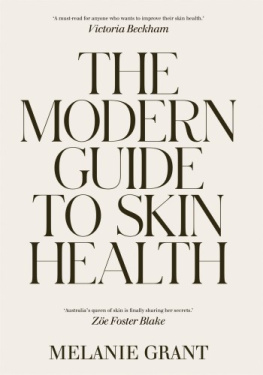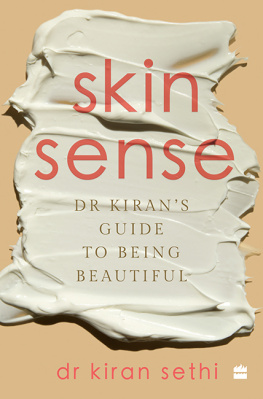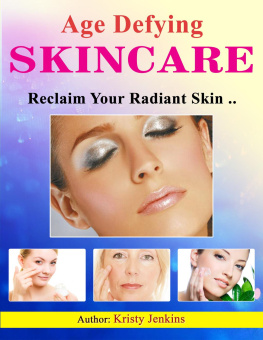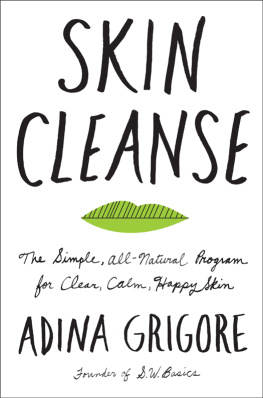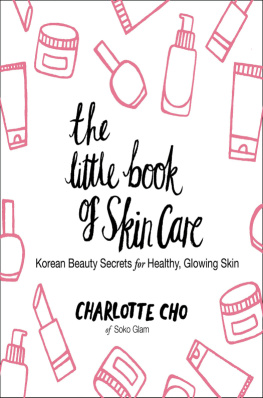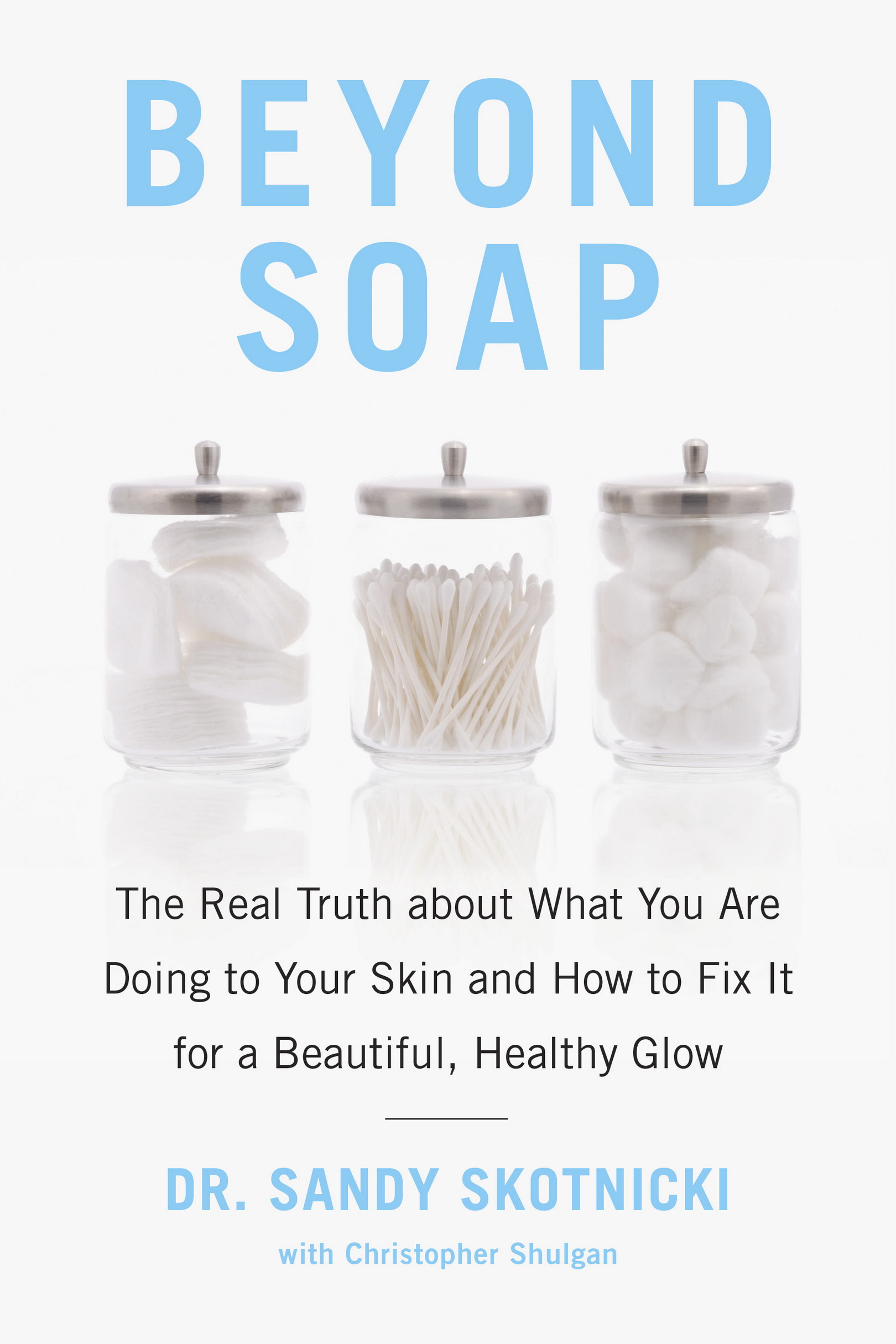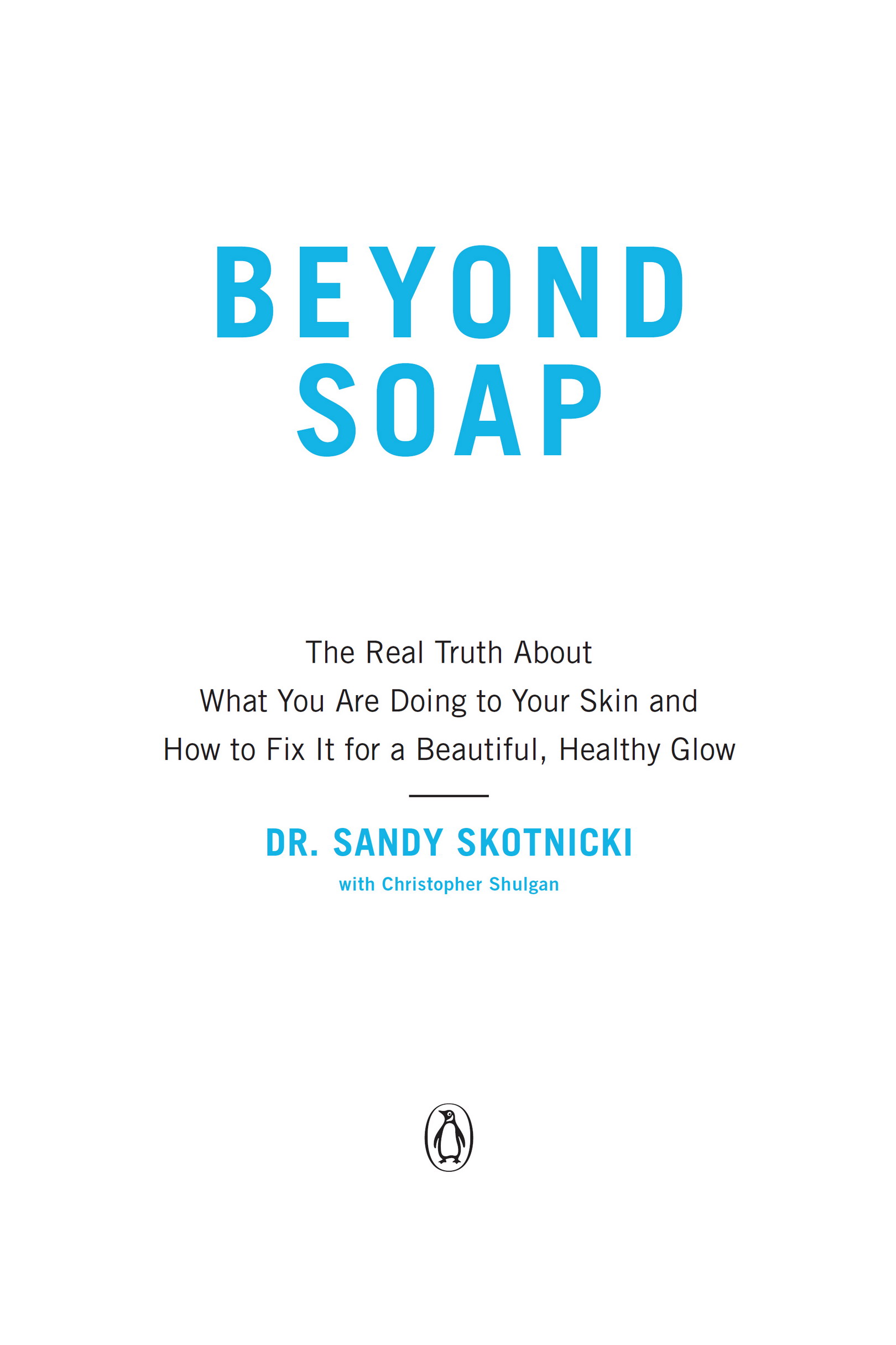Contents
PENGUIN
an imprint of Penguin Canada, a division of Penguin Random House Canada Limited
Canada USA UK Ireland Australia New Zealand India South Africa China
First published 2018
Copyright 2018 by Sandy Skotnicki
All rights reserved. Without limiting the rights under copyright reserved above, no part of this publication may be reproduced, stored in or introduced into a retrieval system, or transmitted in any form or by any means (electronic, mechanical, photocopying, recording or otherwise), without the prior written permission of both the copyright owner and the above publisher of this book.
www.penguinrandomhouse.ca
LIBRARY AND ARCHIVES CANADA CATALOGUING IN PUBLICATION
Skotnicki, Sandy, author
Beyond soap : the real truth about what you are doing to your skin and how to fix it for a beautfiful healthy glow / Sandy Skotnicki.
ISBN 9780735233607 (softcover).ISBN 9780735233614 (electronic)
1. SkinCare and hygiene. 2. Cosmetics. 3. Beauty, Personal.
I. Title.
RL87.S56 2018646.726C2017-904420-6
C2017-904421-4
Book design by Five Seventeen
Cover design by Jennifer Lum
Cover image: DreamPictures/Getty Images
Sensitive skin quiz, , used by permission of Dr. Laurent Misery and Laboratories Dermatologiques Avne.
v5.2
a
To my wonderful parents, Emily and Stan,
who have left this world but are in my thoughts always,
and my beautiful boys, Brandon, Ryan and Spencer
Contents
INTRODUCTION: AN EPIDEMIC
Ive been practising as a dermatologist for 20 years. Im also on the faculty of the University of Torontos Department of Medicine. My academic interest is contact dermatitis, or reactions to the things that come into contact with the skin. And during my decades in practice Ive seen an alarming increase in the number of patients walking into my examining room with a certain kind of skin problem.
The least serious cases complain about sensitive skin. These patients are hyper-aware of whatevers touching them; in fact, theyre hyper-aware of their skin. Moving up the scale of severity, there are patients who complain of burning and stinging anytime they put skin products onto themselves, whether the product is moisturizer, soap, sunscreen or something else. Others experience flare-ups due to the friction from their clothing, the wind or sun exposure. Were talking eruptions that range from mild redness to burning or stinging of the face. It might be persistently dry and cracked hands. Or the sensation that the skin or scalp is covered with insects.
Some cases are so severe that patients cant work or sleep because of the constant itch. The reactions affect peoples self-esteem and hamper their ability to function. Some feel so ashamed of their rashes that they dont want to go outside. The problems can make many peoples lives a living hell.
The type of skin problem Im talking about, in all its forms, is caused by beauty products. And its becoming an epidemic. The number of patients I see to treat these reactions has spiked in recent years. I believe my practice is representative of those in developed countries; dermatologists all over the world are noticing increasing numbers.
In 2016, the U.S. Food and Drug Administration made public, for the first time, comprehensive statistics on adverse events related to cosmetic and beauty products. The data trend was alarming in the extreme. For such products as moisturizers, shampoos and conditioners, shaving creams, cleansers, baby products and makeupthe whole of the skincare and beauty product universe, in other wordsthe FDA registered 291 adverse events in 2013, 436 in 2014, 706 in 2015 and a remarkable 1591 in 2016. Those represent percentage increases of 50 percent, 62 percent and 125 percent in the last three years. You might think these numbers are small relative to population size, but bear in mind, these are events that are reported to the FDA. A team from Northwestern University medical school analyzed the data for a study in a major medical journal (JAMA Internal Medicine). The study authors noted that the FDAs database reflects only a small proportion of all events. That is, the actual number of reactions to cosmetic and beauty products is certain to be far higher. Health Canada tracks its own reports on human health and safety concerns related to various types of consumer productsand cosmetics consistently places among the top five reported sectors.
Or consider whats been happening in the last half-century or so with a condition known as eczemainflamed, scaly, itchy skin. It affects more young people than old. In the 1940s, eczema was relatively rare, affecting just 5 percent of children and comparatively unknown in adults. Today, localities exist where 25 percent of young people suffer from the condition. Adult eczema now affects about 10 percent of adults in the U.S. One interesting thing about eczema is that people with it become more likely to experience other problems, such as asthma and hay fever. A survey that focused on an individual cityAberdeen, Scotlandfound that rates of eczema had increased by three times between 1964 and 1999, while rates of hay fever and asthma had increased by four and five times, respectively. As John McFadden, a dermatologist at Londons St. Thomas Hospital, wrote in the British Journal of Dermatology, the skyrocketing eczema rates reflect a general trend in industrialized countries, and that during the last decade this increased prevalence has persisted.
The really dramatic increase over time has happened with another condition, known as sensitive skin, which is pretty much what it sounds likeskin that is ultra-reactive, intolerant, possibly itchy or otherwise painful, and sometimes, but not always, accompanied by some kind of a rash. The condition is the biggest trend in my practice as well as many others throughout the developed world.
This epidemic troubles some of the worlds most respected dermatologists. The reported prevalence of self-perceived skin sensitivity has increased steadily over time, notes a 2013 article co-authored by the American dermatological legend Howard Maibach. Knowledgeable, experienced observers agree that the subject is not trivial, causes a great deal of distress, and is more than a cosmetic nuisance or a mere matter of vanity, comments a 2006 article lead-authored by Albert Kligman, the co-inventor of Retin-A.
Reports suggest that 40 percent of people worldwide consider themselves to have sensitive skin. Thats a remarkable amount. And the research shows that the prevalence can be even higher in individual countries. One survey revealed that approximately 69 percent of American women self-identified as having sensitive skin. Nearly 85 percent of women in France claimed to be plagued by it. And a whopping 91 percent of Italians told researchers that they suffered from the condition.
Adverse events from beauty products. Skyrocketing rates of eczema. Huge numbers of people reporting that they have sensitive skin.
What on earth is going on?
This is the 21st century! We have instantaneous access to nearly any TV show or movie ever filmed. Driverless taxis are an actual thing! In so many ways, it seems, were living in the futureso why does it seem as if were having more skin problems than ever? Shouldnt the modern lifestyle have solved this problem by now?


